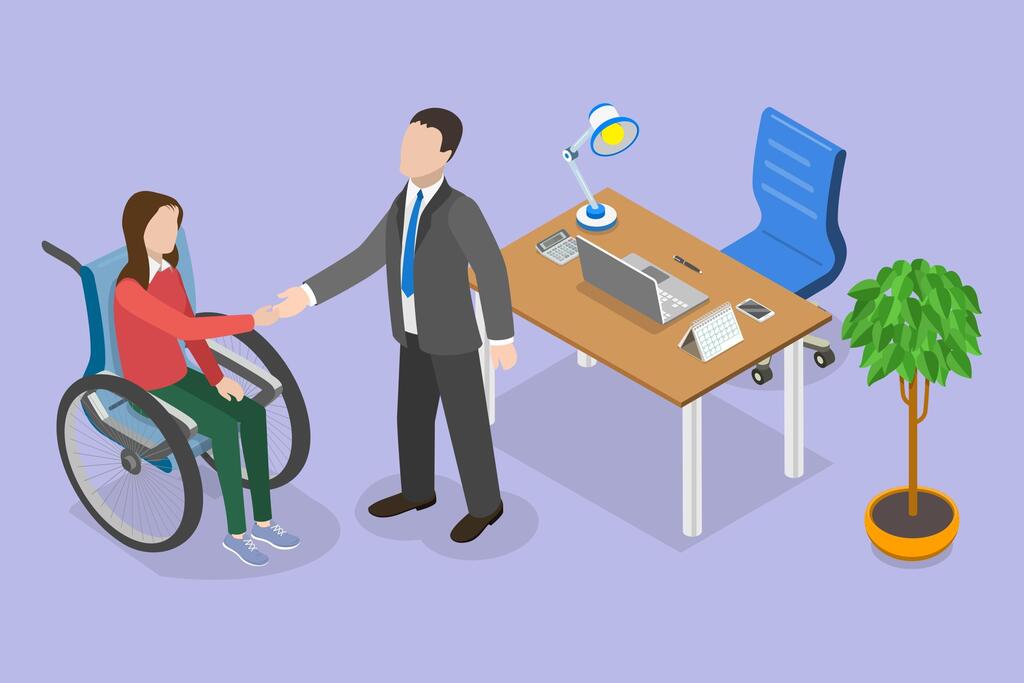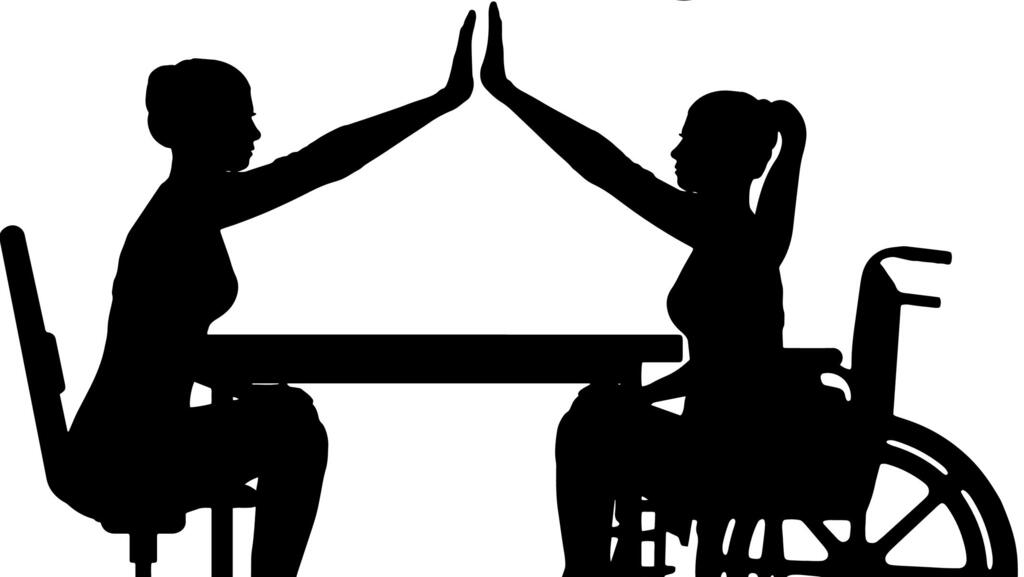Getting your Trinity Audio player ready...
Regardless of the candidate's identity, the process of finding a job and attending job interviews is a long, exhausting, and discouraging process. However, the whole process is much more complex for people with disabilities.
In addition to searching on job sites, sending resumes, waiting for an interview, and dealing with the stress that accompanies the tedious process, people with disabilities raise concerns that seem trivial, yet are crucial for the candidate's employment. Questions such as accessibility, the need to share what the disability entails, and the necessary accommodations for the disabled employee are a mere fraction of the daily struggle disabled people go through when applying for a job.
As someone who has been dealing with this issue for several years, we have compiled useful information for you from the employment experts of "Avoda Negish" (Accessible Work in Hebrew), a website for finding employment for people with disabilities.
Should you disclose your disability?
One of the topics that interest job seekers who are dealing with a disability is the question of whether to disclose the disability to the employer, especially when it comes to "transparent" disabilities that are not necessarily visible to the eye, but have effects on the functioning of the person dealing with them - starting with mental disabilities, through various chronic diseases ( Crohn's, endometriosis and more) to chronic pain.
On the one hand, disclosing your disability will make it possible to request adjustments in the workplace, and will remove the burden of keeping it a secret. On the other hand, some fear that if they reveal their disability, they will be discriminated against during the hiring process or will be treated differently during the interview or during the work itself.
From our point of view, it comes down to one issue. In your opinion, will the disability affect your performance at work? If it will not affect your performance, there is no need to share this with the employer. However, if the company promotes the disabled community or you feel comfortable with your employer, you can disclose your disability and avoid keeping a secret that weighs you down. One of the ways to share is through the cover letter sent along with the resume or consider telling about it during the job interview.
If in the employer's opinion, your disability may affect your performance at work, requiring accessibility adjustments, such as physical adjustments to the work environment, flexibility in working days and hours, training, and mentoring, it is paramount to talk with them about this and arrive at the interview with suggestions and ideas for possible adjustments. Don't forget that aside from your disability, each person has numerous skills and that's what matters. So let your skills speak for you!
Questions about body language
The art of job searching and preparation includes shaking hands with the interviewer at the beginning and end of the interview, and body language throughout the interaction. Job searching experts stress the importance of sitting up straight and shaking hands not too strongly but not in a flimsy manner either.
What do you do if your physical disability does not allow you to shake hands with such ease? And how do you deal with a situation where hand mobility is limited or is just paralyzed? And what if you don't have a hand at all?
First of all, don't fear! The interviewer is likely even more stressed and embarrassed than you are. Now is your time to break the ice by smiling, maybe telling a joke, and extending your hand in a way that is comfortable for you. This way you will prove that you are in control of the situation, prepared, and able to face any incoming challenge.
The vicious cycle of work experience
How will you get hired for a job that requests experience if no job will hire you so you could acquire experience? You won't always be able to present experience in the requested field, but at the same time, you should be familiar with a must-know concept: transferable skills. This concept refers to the variety of abilities and qualities we have accumulated during the experiences and challenges we have faced throughout our life, which can be transferred between jobs.
Identifying and recognizing transferable skills enables adaptation and flexibility required in today's work environment. These skills can include interpersonal or group communication, resourcefulness and the ability to present quick and effective solutions to various problems, showing initiative and creativity, technical abilities, technology orientation, independence, and a drive to stay active.
These abilities are not specific to a particular job or a specific occupational field. These skills are developed and perfected while trying different experiences in everyday life, not necessarily in a specific workplace.
Our recommendations for preparing for a job interview are as follows:
• First, analyze the position for which you are applying and list the tasks that you will be expected to perform. This way, you will understand the required overall skills to perform the job description.
• Second, you might want to formulate examples from your professional past or other activities, which illustrate and demonstrate those skills.
• Lastly, practice speaking about your strengths and your transferable skills with an employment counselor. Learn how to turn a conversation into your repertoire beyond the content of your resume when speaking with a potential employer.
"What are your shortcomings?"
The job interview is almost over, you have already presented your resume, told about all your achievements and skills, went over your professional experience, and made a great impression. Then, the interviewer may ask the scary question: "What are your weaknesses?" or "What are your shortcomings?"
Yes, it's stressful. But remember this is not a trick question intended to fail you because everyone has weaknesses and no one is perfect. The employer mainly wants to understand how you deal with challenges, testing whether you know how to find solutions. It is good to arrive with a go-to answer for this question.
What do you answer? There is no definitive formula, but here are some guidelines:
• First, answer honestly but not in too much detail. Do not invent a weakness that does not exist (and please don't say you are a perfectionist).
• Second, state a weakness that does not fall directly under the requirements of the position you are interviewing for, but something more general. If, for example, the job description has a lot of teamwork - don't mention that you like to work alone.
• Show the interviewer you are aware of your weaknesses and are working to improve them to be a better employee. Don't be afraid to show him that you found a solution to tackle these weaknesses in the past, and repeat the mantra that you want and are doing everything to improve. This will indicate resourcefulness and willingness to learn. For example: if your weakness is being disorganized, tell about task management apps that you use and share how they helped you.
• If the weakness concerns your disability, tell about things that assist you such as technology and other tools that allow you to work. Most importantly: remember that just as we all have weaknesses, each of us has quite a few advantages!
The keys to passing these interviews are honesty, reliability, and resourcefulness, which are also qualities that are important to any employer, and they may be a greater advantage than one small weakness.
Job search guides
If you are not familiar with the website "Avoda Negisha" which operates on behalf of the Labor Ministry, now is the time.
 Dani GarmisePhoto: Private album
Dani GarmisePhoto: Private albumThe site has a job board with hundreds of job offers for people with disabilities in several fields, from engineering and software development jobs to administration jobs, and also a smart assistant that sends notifications about relevant jobs by email. The website helps disabled people find work and helps companies employ disabled people. The site's help center is available by phone (5427*) and by chat.
Dani Garmise is a writer, creator, lecturer, and wheelchair user, and also editor of the website "Avoda Negisha" for the employment of people with disabilities.



